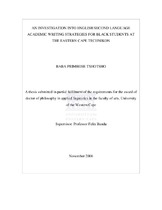An investigation into English second language academic writing strategies for black students at the Eastern Cape technikon
Abstract
This study has been prompted by the negative remarks that lecturers make concerning the academic performance of students and the number of years they spend at the Eastern Cape Technikon before completing their diplomas. The aim of this study was to identify the kinds of strategies that English Second Language (ESL) students use to cope with English language writing tasks. Academic writing requires a conscious effort and much practice in composing, developing, and analyzing ideas. Black students at tertiary institutions in South Africa face additional difficulty, especially when they have to deal with writing in English which is an unfamiliar language to them. This presents them with social and cognitive challenges related to second language acquisition. Since the black students do not often consider the social contexts in which L2 academic writing takes place, models of L1 writing instruction and research on composing processes are often found wanting in their L2 writing pedagogy. In this study, I argue that language proficiency and competence is the cornerstone of the ability to write in the L2 in a fundamental way. L2 writing instructors should take into account both strategy development and language skill development when working with black students. This is critical in South Africa considering the apartheid legacy and the deprived social conditions under which black students often live and acquire their education. Therefore, using critical discourse analysis and aspects of systemic functional linguistics, this study explores errors in written cohesion and coherence in relation to L2 writing strategies used by black students at the Eastern Cape Technikon. The study focuses on errors in the form of cohesive devices of referring expressions using topic development used by students. The aim was to explore the strategies used by black students to write coherent academic texts. Further, the study intends to scrutinize the grammatical devices of reference, through analyzing the forms of cohesive devices and theme development. A focus on the writing process as a pedagogical tool enables me to explore the relationship between the quality of students‟ academic writing and coping strategies used, and come up with a model of L2 writing (coping) strategies for academic writing at the Eastern Cape Technikon. I investigate the L2 writing process adopted by competent and non-competent black students in the process of producing coherent academic texts by comparing strategies that the two groups of students adopt.

